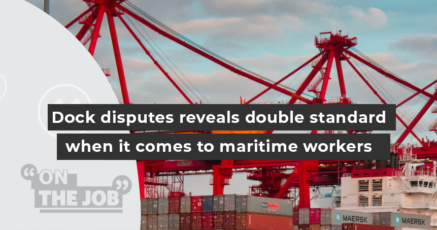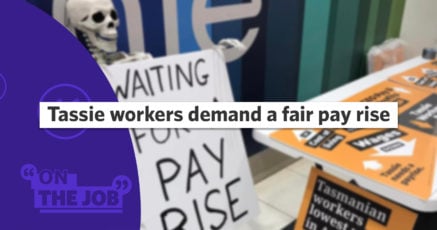Cost of living crisis? What cost of living crisis?
This level of denial is the attitude we’re seeing from corporations and business as the Fair Work Commission (FWC) prepares to rule on whether Australia’s lowest paid workers will be receiving a decent pay rise that will help them deal with rising inflation and interest rates.
Although it is the FWC who makes the final decision, they take into accounts submissions from public groups such as trade unions and business lobbies.
In their final submissions to the Annual Wage Review, employer lobby groups argued that a pay rise for struggling workers should be delayed for a further four months.
The Australian Chamber of Commerce and Industry (ACCI) supports only an increase of up to three per cent in the minimum wage, remaining behind headline inflation of 5.1 per cent.
The National Retail Association also said that any wage rise should be deferred until November 1 due to “exceptional circumstances” including a labour shortage crisis.
Rather than offering pay rises to attract workers, employer groups want to lock in a real wage cut. It seems there’s never a time for a pay rise according to the bosses and their lobbyists.
The Australian Council of Trade Unions (ACTU) secretary Sally McManus is unimpressed with the employer lobby groups’ positions.
“Several of the employer groups are arguing that increasing wages will make it harder for them to attract staff. We would encourage them to test that theory”.
“Arguing for pay freezes and cuts for working people when all the economic indicators support a significant pay increase makes it crystal clear that some of these employer groups will never support pay rises for workers,” McManus says.
Workers in sectors such as hospitality, accommodation, tourism and retail are struggling after years of real wage cuts. Pay rises have evaporated and the cost of everyday living expenses like petrol, groceries and power have galloped ahead.
Not that these factors seem to bother these employer groups. Sally McManus astutely points out the hypocrisy of big business enjoying another strong profit season.
It’s is morally indefensible for employers to argue for pay freezes when profits are up 20 per cent and on every measure businesses have recovered well from the pandemic.
The biggest risk to business is actually consumer spending which, ironically, they are seeking to damage through their proposed wage cuts.
Sally McManus
ACTU secretary

The Centre for Future Work (CFW) at independent think tank The Australia Institute recently did a deep dive into Australia’s national accounts.
As the researcher in question, CFW economist and journalist Greg Jericho tells On the Job that big business has raised massively the profits going to corporations as a percentage of national income.
This unfair distribution of the national income into the pockets of big business has come at the expense of wages delivered to workers over the past few decades.
“What’s happened in the past year is massive increases in prices out of the pandemic due to supply shortages and also the Russian invasion of Ukraine,” Jericho says.
“We’re seeing companies making out like bandits. In fact, the [Australian] Bureau of Statistics made note that Australian businesses have done well out of rising prices. It has really just set a fire to the whole system.”
The Albanese Government supports a wage increase, formally backing a pay rise of 5.1 per cent for Australia’s lowest paid workers in its submission to the FWC’s annual wage review.
Employment and Workplace Relations Minister Tony Burke affirmed that workers are at breaking point as their bills skyrocket but their pay packets remain static.
“The cost-of-living crisis is so acute for people on lower wages. That’s why we felt the need to put in that straight principle that those workers should not be going backwards,” he said.
“What the submission says is the new government does not want to see Australian workers go backwards,” Mr Burke told ABC Radio in Perth earlier in the week.
Sally McManus continues to urge the FWC to ensure workers are given a pay rise that will help workers meet their basic needs.
“We currently have a cost-of-living crisis, with productivity high and profits at record levels, low unemployment and the lowest labour share of GDP on record. Anyone not currently advocating for wage growth is ignoring the problem,” she says.
“Working people cannot be left behind in the recovery from the pandemic. The Annual Wage Review is the first step in ensuring that we share the recovery from this crisis across the economy.”







SHARE:
Wage rises: Business groups tell workers tough luck